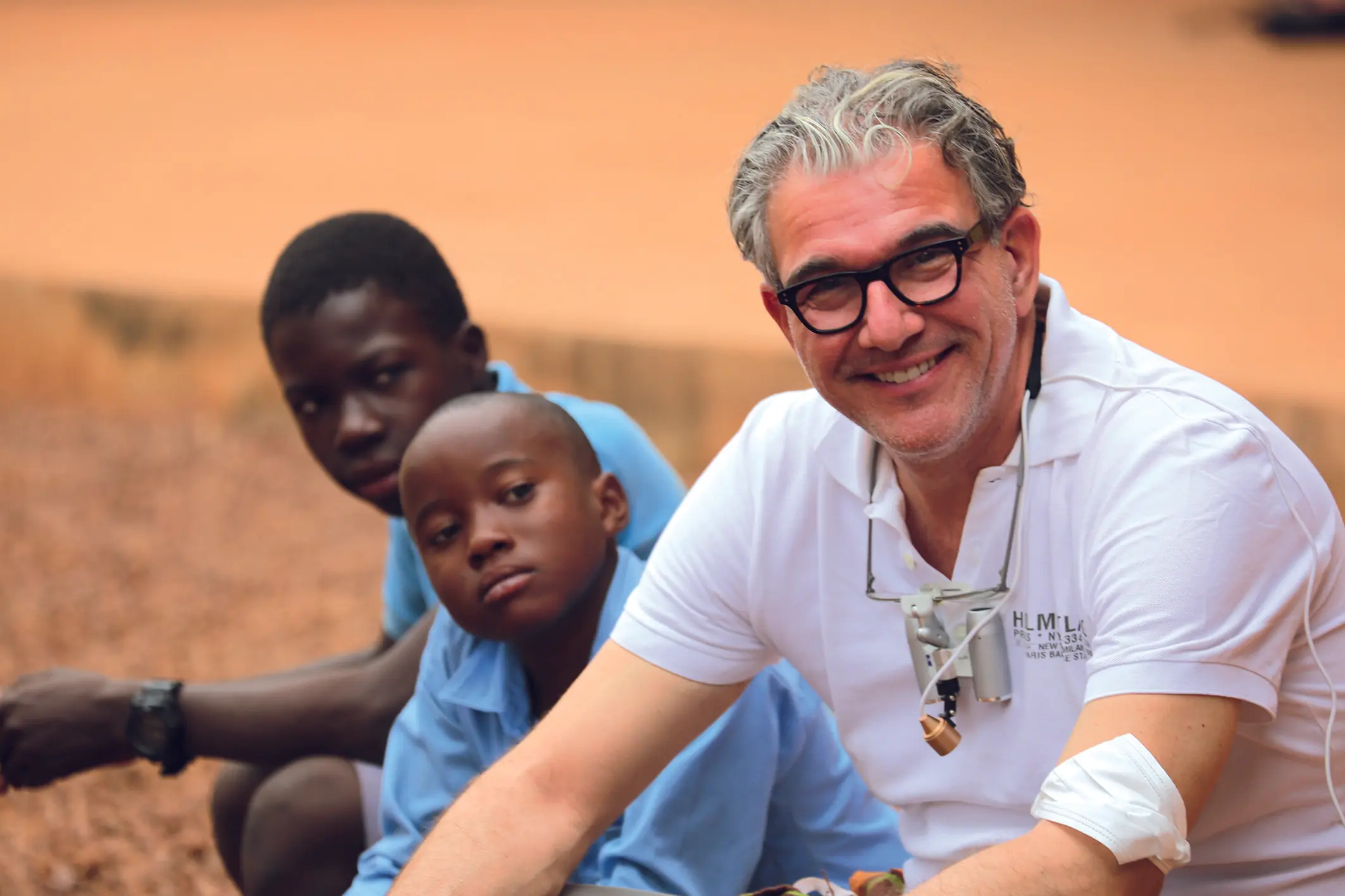
Dr. Mark T. Sebastian at Lycée Schorge in Burkina Faso. As an ambassador for Humble Smile, he teaches the children at the school the importance of brushing their teeth and dental prophylaxis.
December 3, 2024
Christine Bürg und Margit Hiebl
Where does the job end and the true calling begin? Nine doctors share how they not only overcome their own limits for this but also which aid projects they are involved in.
With experts from our network
There are no exact numbers, but the estimates are drastic: There are not even 100 dentists in Burkina Faso for 23 million inhabitants. The West African country is not only one of the poorest in the world, but also has the highest periodontal disease rate internationally.
The Munich "Stern Stewart Institute" supports the people in Burkina Faso with numerous aid projects, including the construction of the Lycée Schorge middle and high school. In addition to classrooms and offices, a dental station is also housed here. As part of the prophylaxis project "Schorge Smile," Munich dentist Dr. Mark T. Sebastian is involved at Lycée Schorge.
As an ambassador for the aid organization Humble Smile, he finances the dental station and a dental hygienist with his "Max 36" practice. And he collects donations, in the form of old gold, for example, which he can reinvest in the Lycée Schorge through the German Dentists' Relief Organization. Once or twice a year, he travels to Burkina Faso himself to perform procedures, help educate the children, and provide advisory support.
"By training the children, especially girls, in dental cleaning and having them pass these experiences on to their family members, we contribute to awareness and thereby make a contribution to social change," says Dr. Sebastian. Because periodontitis is not limited to the gums, but promotes numerous internal disorders such as heart disease, miscarriages, diabetes, and rheumatism. Infos: sternstewartinstitute.com ; humblesmile.org
"Helping someone to see means offering someone better future prospects," said Dr. Florian Kretz . The chief surgeon and medical director of Precise Vision Ophthalmologists in Erlangen, Greven, Rheine and Steinfurt founded the non-profit organization "Ophthalmologists for the World GmbH" in 2016 together with his wife Nicole, which primarily supports the "Khmer Sight Foundation" in Cambodia.
Dr. Kretz, who travels to Cambodia once or twice a year himself, has operated on thousands of people together with doctors and medical staff from all over the world, trained surgical nurses and support staff, and set up a day clinic in Phnom Penh to German standards. The organization is funded by donations and his company.
"Ophthalmologists for the World" is a family affair: Everyone helps out. "My wife does the marketing, assists in the operating room on site, helps with the preparation and follow-up of patients, and sterilizes the instruments," says Dr. Kretz. "My son handles diagnostics and, together with my daughter, measures the patients." The Kretz family and members of his team invest many vacations to help the people in Cambodia.
"The smile of the people is moving when you take off the bandage and they can see again. Particularly touching: a twelve-year-old boy who could no longer see due to an accident at the age of six. After an operation by Dr. Kretz, he was able to read the very next day. Why is the doctor involved in Cambodia? "I want to do something that is sustainable. And set an example for my children that you should never give up, but above all, give back." Information and donations: drkretz.de/charity
"For me personally, it is important to practice my profession holistically, not just in a subspecialty, and thus to be able to help people even more," says Dr. Christian Merkel. The Munich dermatologist from the Skin and Laser Center at the Opera has been involved since 2018 in a medical camp near Bangalore in southern India, which was founded in 2015 by the Krefeld ENT doctor Dr. Susanne Wagener. The goal of the voluntary association is to establish free medical care for the residents of the city of Penukonda and the surrounding villages.
In the region dominated by agriculture, there is virtually no basic medical care. The ways to the nearest hospital are long, and the journey there is unaffordable for most. Therefore, the medical camp takes place once a year. The organization on site is handled by an ashram. The staff take care of announcing the date in the villages, preparing the clinic, and assigning treatment appointments. Each doctor has their own treatment room and interpreters available.
Everything is financed through monetary and in-kind donations. "The medications are partly brought by us doctors, and we also contact pharmaceutical representatives," says Christian Merkel. "Even after my specialist training, I looked for ways to get involved socially, including with 'Doctors Without Borders.' Unfortunately, without success due to my specialty."
Dermatologists are apparently not needed. Today's experience teaches him the opposite: Around 100 patients come to Merkel's consultation per day, not counting those who appear without an appointment, but of course are also treated. For him, it's an intense time each time, which has now led to a deep bond - with the ashram staff as well as with the patients.
At the same time, it is always a time of learning, also professionally - for example, through diseases or skin problems that are no longer encountered here as a rule, such as leprosy and scabies. The preparations for the 2025 camp are currently underway. "The long-term goal is for doctors we also train to treat their patients there all year round - unfortunately, there is still a lack of financial resources for this," says Merkel. Info and donations: medicalaid-india.com
Almost 90 percent of the approximately 37 million blind people worldwide live in poverty areas. This also includes Puma in central Tanzania. Main causes of blindness are often cataracts and glaucoma, trachoma, river blindness and vitamin A deficiency – diseases that are usually preventable or curable.
However, because Tanzania lacks the necessary knowledge, prevention options, medications and their distribution, as well as skilled personnel, the non-profit association "Vision for Puma e.V." was founded in Berlin 14 years ago, also supported by Dr. Volker Rasch with his Potsdam eye clinic founded 30 years ago. Each year, "Vision for Puma" organizes multi-week relief missions. "Usually," says Dr. Rasch, "two ophthalmologists, an OR nurse and an optician are on site, volunteering in their free time, traveling with medication, glasses and equipment."
The aim is also to pass on knowledge and train people on site. In 2022, the association initiated another project in Zanzibar and set up an eye unit in a military hospital in Stone Town. "During the first two-week Eye Camp alone, we treated over 1100 patients and performed 100 operations."
The vision: the construction of a new eye clinic. The motivations for his commitment? "We work here in a high-tech world with high patient demands. In Tanzania, we often have to improvise, which can be quite salutary. While at home the focus is on quality and a desire to always improve, the commitment in Africa causes us to put our own life situation into perspective." Information and donations: vision-for-puma.de
"It is the special atmosphere that is clearly noticeable here," enthuses Prof. Dr. Henning Windhagen about the Diakovere Annastift. "When employees are introduced, there are official rites; the older ones, who still know the sisters, pass on this relaxed, traditional thinking to the younger ones." And although there is a chapel, a house pastor, and services on the premises, "people who are critical of religion do not feel uncomfortable."
The fact that the employees are particularly committed is also due to the corporate structure. "We are a GmbH," says the Medical Director of the Orthopedic Clinic of the Hannover Medical School (MHH) in the Diakovere Annastift, "which means that everything we earn in profits is reinvested into the company and does not go, for example, to shareholders."
In fact, Diakovere not only includes hospitals such as the Annastift, Friederikenstift, and Henriettenstift, but also a rehabilitation facility for severely injured accident victims, nursing homes, a hospice, a vocational training center for people with disabilities, and an inclusive elementary and secondary school.
"We have a large specialized center for medical treatments for adults with disabilities," says Prof. Windhagen. "We see both here: alongside athletes and highly active patients with the highest sporting demands, we also treat real tragedies, and this shapes all involved. A major advantage for patients is the role of the university clinic, which is outsourced to the Annastift. Here you have both facets: Christian charity and care, but also high-tech medicine with special implants and robots."
The spirit of charity and respect that prevails here is palpable everywhere: "There is no elbow mentality, but quite the contrary, extreme team spirit," says Prof. Windhagen. "It is said that people who have a task and see meaning in their work are the happiest."
Retired but far from resting: For about 16 years, the former Medical Director of the Clinic for Sports Orthopedics of the Munich Clinic rechts der Isar, Prof. Dr. Andreas B. Imhoff, and his wife Susann have been supporting "Die kleine Pyramide e.V." The idea of this charity is to support orphaned or disabled children and their families in Luxor, Egypt through sponsorships and to care for them in their own therapy and social center.
To tackle this large task, there are now eleven permanent employees in Luxor. A lawyer takes care of all legal matters for families with disabled children. In addition to comprehensive medical care with prosthetics and orthopedic technology, the NGO based in Trier also enables school and vocational training. "My wife works at the charity twice a year, training women in sewing courses," says Prof. Dr. Imhoff. "With donated sewing machines and fabrics, they produce high-quality bags, cushions, and baby clothes to earn a certain income for themselves and the children."
That's not all: Susann Imhoff is supported by a German dentist who works voluntarily and teaches children about dental hygiene. "I myself am on site once a year and exchange ideas with the Egyptian doctors." What are they particularly proud of? "We were able to provide a 16-year-old boy with an amputated leg with a leg prosthesis, prosthesis training, and rehabilitation. Today, he is integrated into society as a self-employed taxi driver."
So it's not just about medical development aid, but also about human dignity and self-confidence. "We are happy to help children and illiterate mothers gain education and independence." Information and donations: die-kleine-pyramide.de
"Caritati – Veritati" – committed to charity and truth – is written on the front of the Maria Theresia Clinic in Munich. It is run by the Sisters of Mercy of St. Vincent de Paul. Following the example of their patron saint, they are committed to helping "needy, poor, sick, old, and searching people." Charity, truth... – values that one generally expects in a medical or caregiving environment, although reality unfortunately often tells a different story.
"The topic of humanity is indeed of great importance here," explains the head of the Center for Minimally Invasive Pain Therapy. Dr. Claudius Gall. This is particularly reflected in care, where personal attention plays a crucial role in this religious institution.This spirit of charity is carried by the nuns who work there in various roles. And they don't watch the clock when it comes to fundamental existential threats: distress, illness, death.
"That's exactly when you need support; no one can handle it alone in the long run." And it doesn't matter whether someone has private or statutory health insurance. "It's about offering high-tech medical care and giving this medicine a human face."
"That's old-fashioned in a positive sense," says Dr. Gall, but it also follows substantive and economic necessities. "A religious institution has to keep its accounts in the black, but it is not obligated to any shareholder value. This makes it easier to undertake and implement long-term projects."
"I want to enable people to share their concerns and questions by sharing my knowledge outside of my practice in this personal setting, in an understandable and non-binding way," says Dr. Christoph Wenninger , Implantologist from Munich. For this he regularly acts as a guest speaker for the 'Infoforum Gesundheit'. Nationwide, around 15 dentists participate with lectures and activities. The goal is to make complex diseases and therapies more understandable and transparent. But also to encourage patients to positively change their own health behavior.
"Often it is patients who were not adequately informed about implants by their practitioner and feel left alone," says Dr. Wenninger about the typical visitors. And if Dr. Google is their first point of contact, personal contact with a doctor becomes all the more important in his experience. "Many often know quite well, but still want to ask their questions to a doctor who stands physically in front of them. Here they get concrete information first-hand, which may not be available on the Internet."
The full range is in demand - from the procedure to solutions and modern diagnostics to costs. But not only do the patients benefit from these events. For Dr. Wenninger, they are a valuable source that helps to improve the doctor-patient relationship. It is not uncommon for this to become a topic for the next lecture. Info: info-forum-gesundheit.de
Depression is a normal medical condition that can be diagnosed, treated, and cured. One in five of us is affected by it at some point in our lives. And the numbers are rising. Education is important to give the disease societal acceptance as such. Regional alliances against depression, a network under the umbrella of the German Depression Aid und Suizidprävention, die sich in 90 Regionen und Städten deutschlandweit etabliert haben.
Eine solche Plattform hat Prof. Dr. Andreas Menke auch im Chiemgau gegründet, als er die ärztliche Leitung der psychosomatischen Klinik Medical Park Chiemseeblick in Bernau übernommen hat. Ziel des „Chiemseer Bündnis gegen Depression“ ist es, das Thema zu enttabuisieren. In diesem Rahmen werden verschiedene Kanäle bespielt: Dazu gehört ein Instagram-Account, auf dem Informationsvideos gepostet, aber auch Aktionen und Termine angekündigt werden (@chiemsee_gegen_depression).
Darüber hinaus gibt es Aufklärungskampagnen, Schulungen sowie Vorträge, beispielsweise im Rahmen des „Mental Health Café“. Die zwanglosen, gemütlichen Treffen, die immer wieder in einem anderen Café stattfinden, sind niederschwellige Angebote für alle, die sich für psychische Gesundheit interessieren. All diese Maßnahmen greifen ineinander, „somit wird auf vielfältige Weise nicht nur die Öffentlichkeit aufgeklärt, sondern auch die Situation für Betroffene und Angehörige verbessert“, so Menke.
„Eine Vernetzung findet dabei nicht nur auf Ebene der Behandler statt, sondern auch mit den Gesundheitsämtern, den Selbsthilfegruppen und anderen Angeboten wie Beratungsstellen und Telefonhotlines.“ Dass diese Projekte tatsächlich auch wirken, zeigt eine Untersuchung, die im Rahmen eines der ersten Bündnisse in Nürnberg gemacht wurde: „Hier wurde über drei Jahre die Suizidalität untersucht und diese mit einer Kontrollregion, nämlich Würzburg, in der es zu dieser Zeit noch kein Bündnis gab. In Nürnberg gin-gen suizidale Handlungen um beeindruckende 30 Prozent zurück“, so Andreas Menke.
Infos: deutsche-depressionshilfe.de
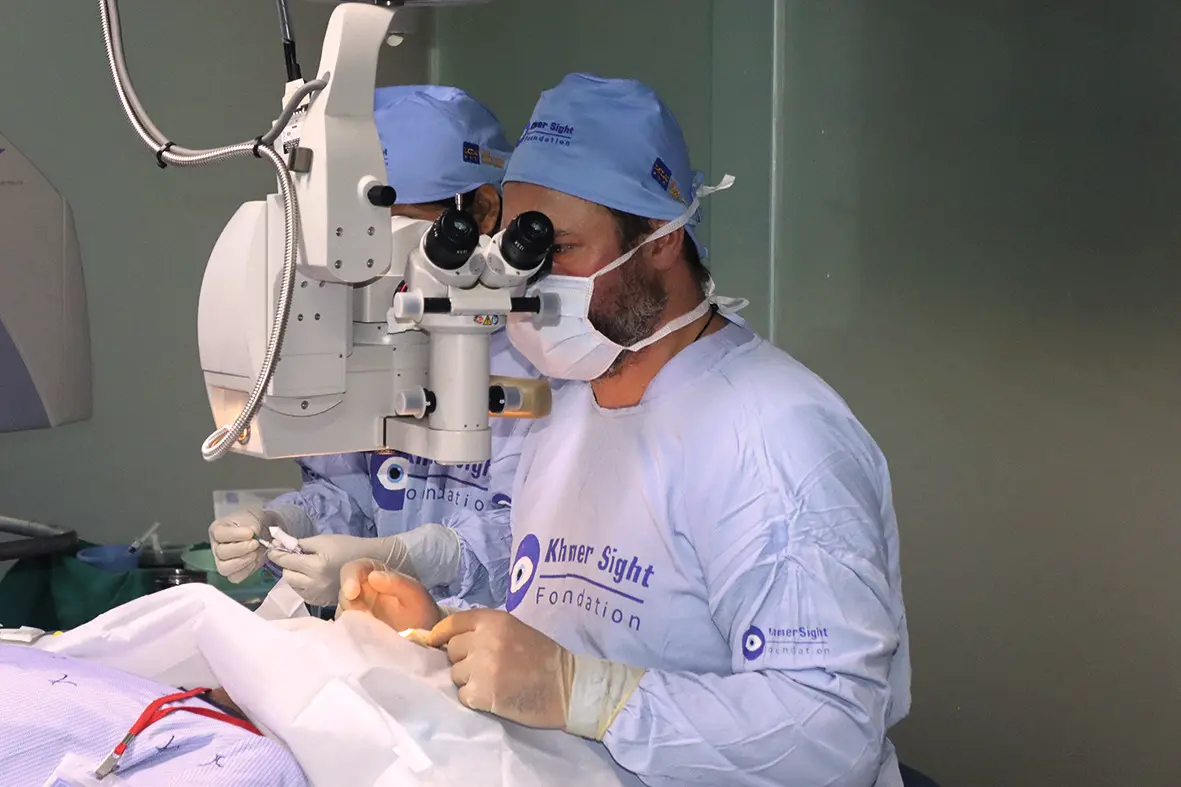
Deployment abroad: Twice a year, ophthalmologist Dr. Florian Kretz operates in Cambodia, enabling many children to see again.
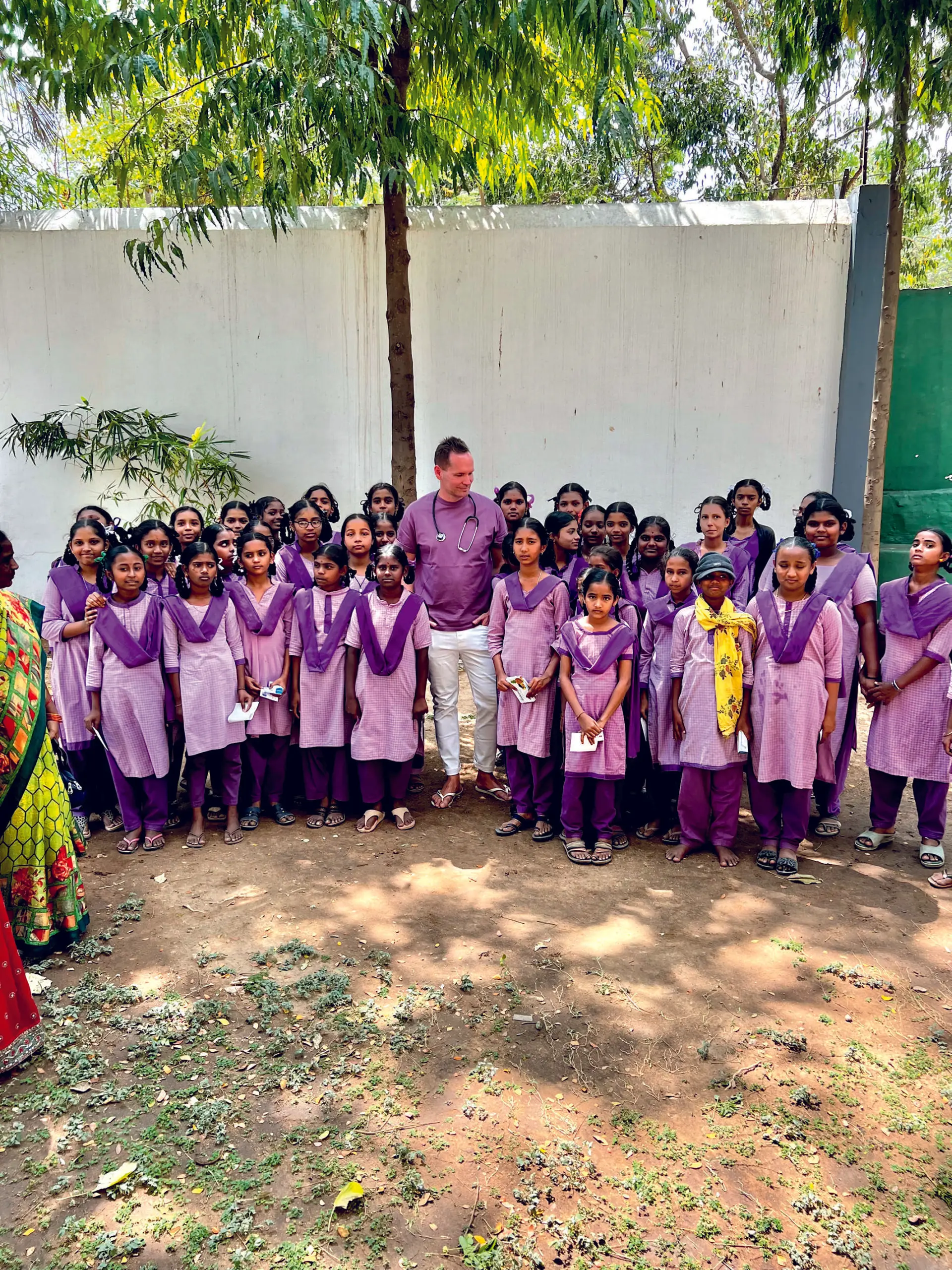
Dermatologist Dr. Christian Merkel treats over 100 small and large patients daily at the Medical Camp in Penukonda, South India.
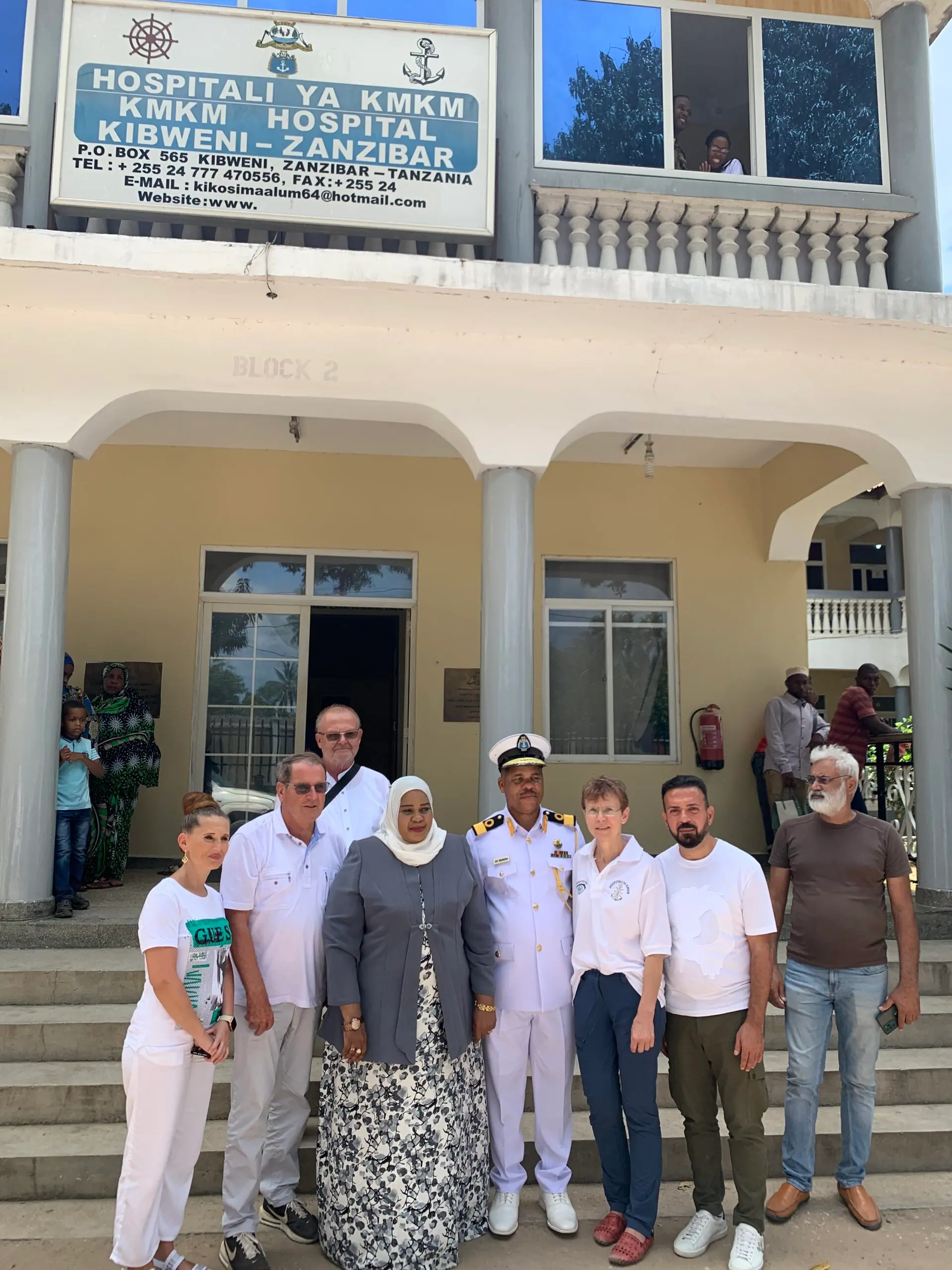
Dr. Volker Rasch (in the back) at the opening of the new eye surgery center in Zanzibar – here, among others, with Dr. Frank Klemm, the chairman of “Vision for Puma”
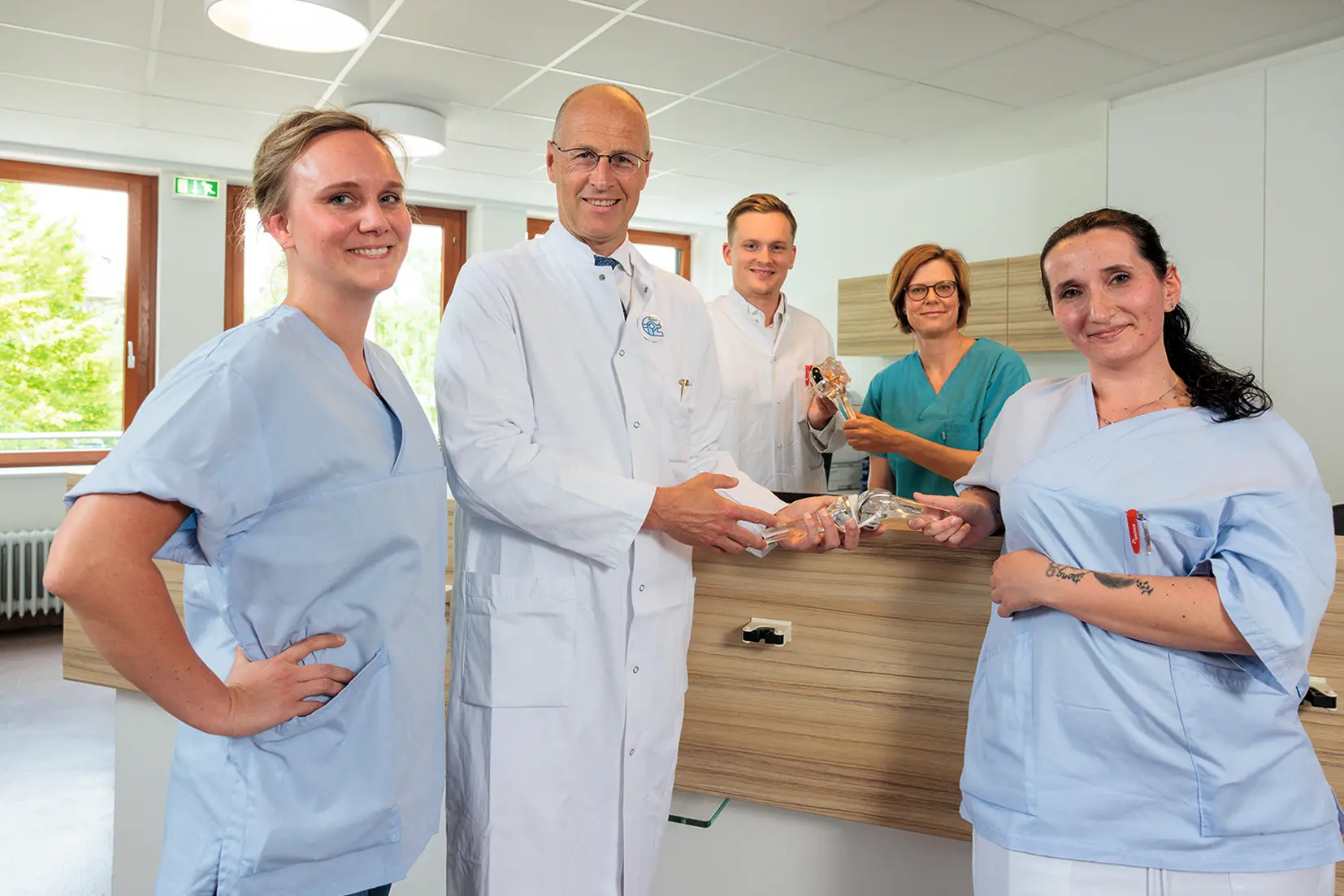
© Michael Wallmüller
Applied Charity: Prof. Dr. Henning Windhagen with staff in front of the Diakovere Annastift
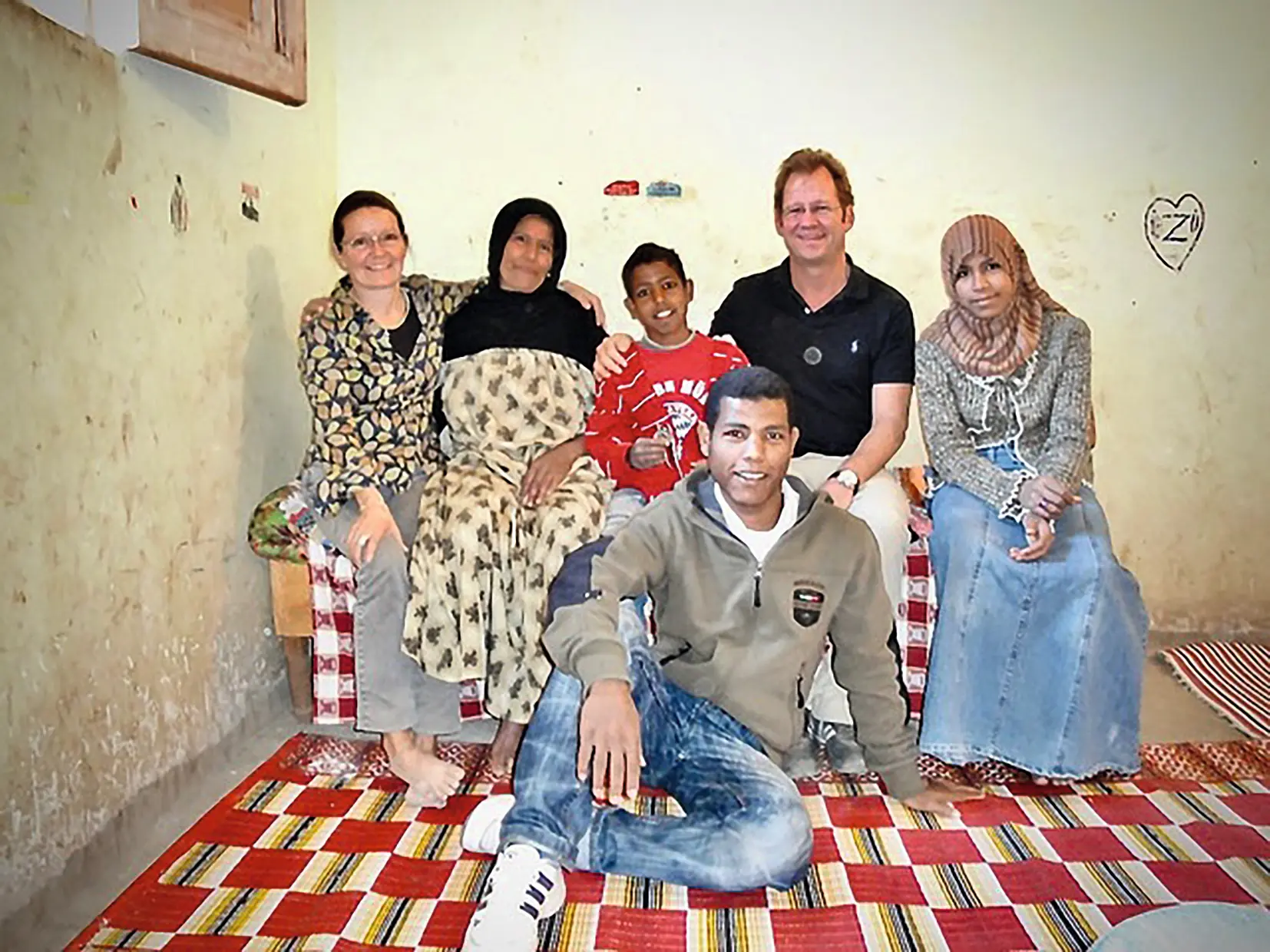
© Burkhard Schulz
Guide to Independence: Susann Imhoff (left) teaches Egyptian women in Luxor how to sew. Her husband, Prof. Dr. Andreas B. Imhoff, supports the doctors on site.
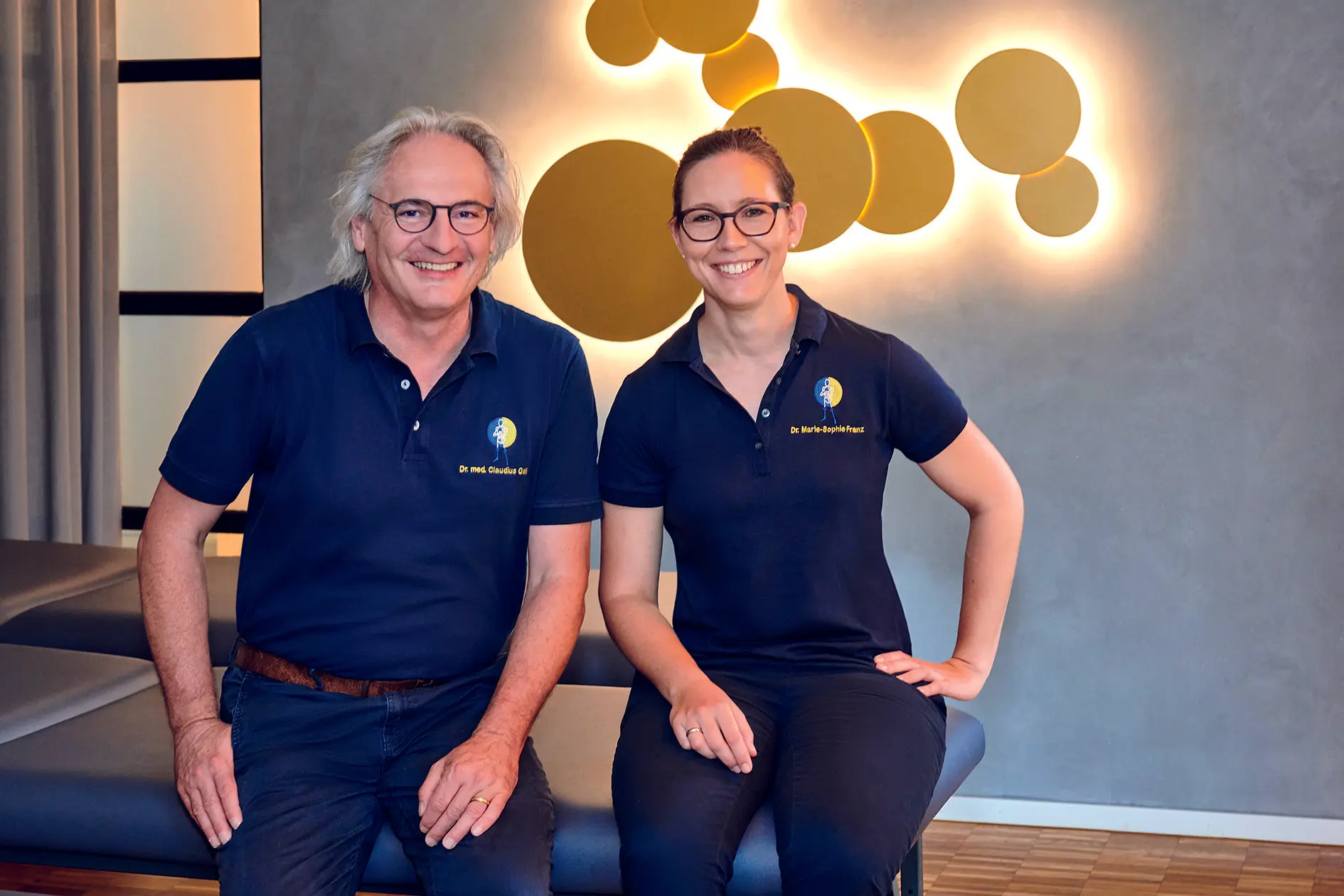
© Astrid Obert
Dr. Claudius Gall and colleague Dr. Marie-Sophie Franz value the principles upheld at the Maria-Theresia Clinic in Munich, above all: humanity.
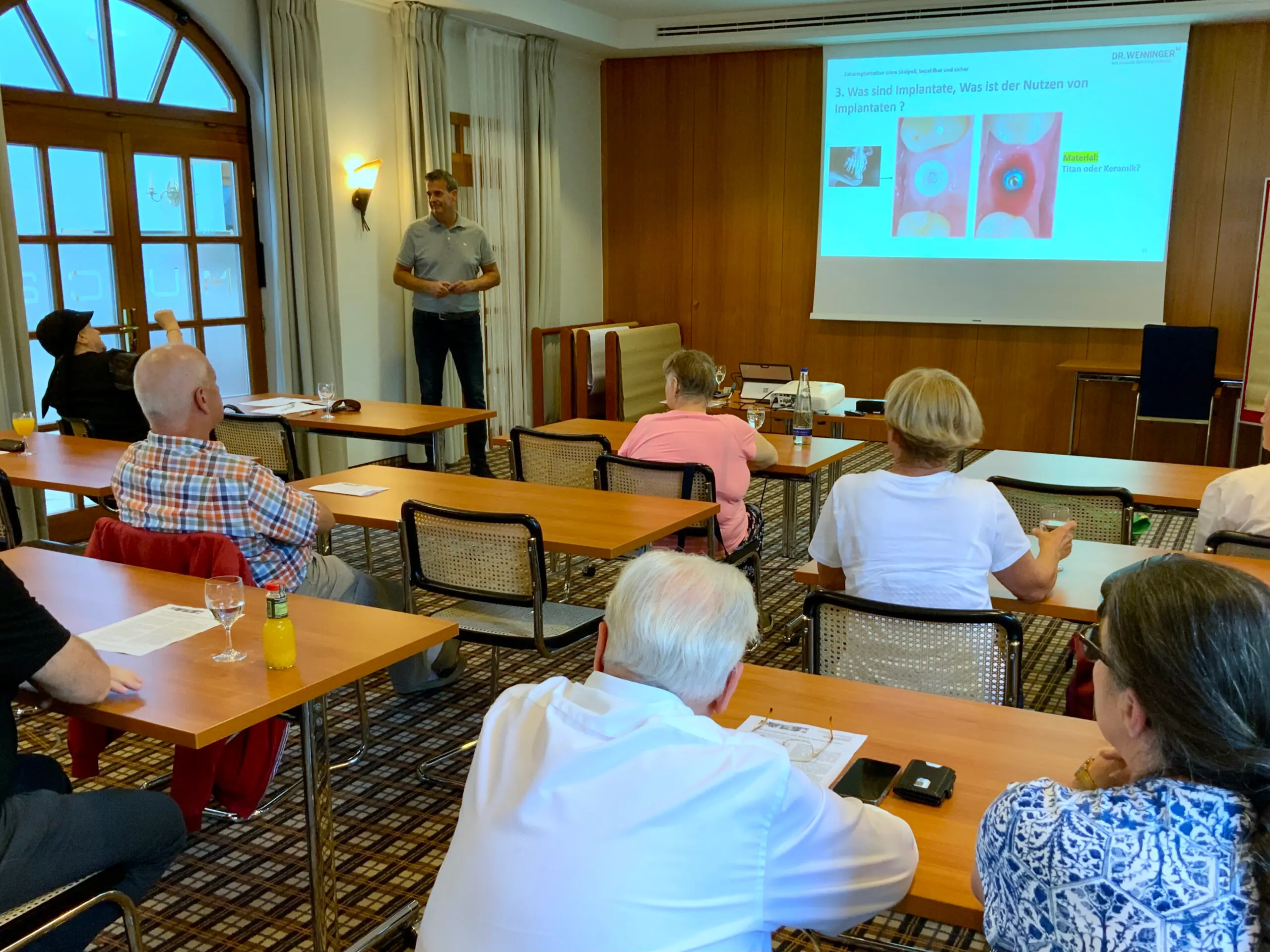
Patient information: The implantologist Dr. Christoph Wenninger ensures transparency in all matters with his lectures.
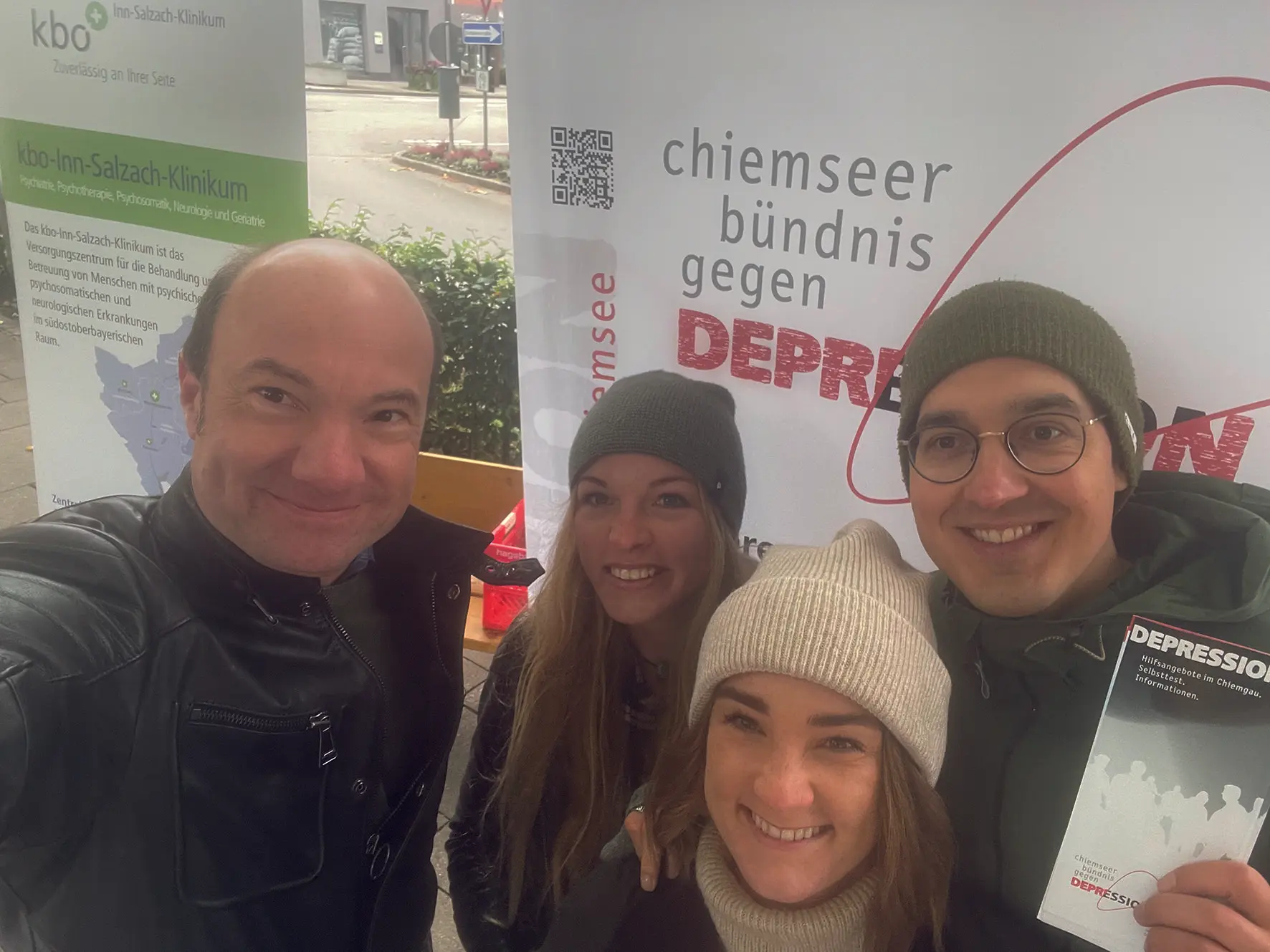
To raise awareness about depression, Prof. Dr. Andreas Menke regularly organizes meetings in so-called "Mental Cafés".